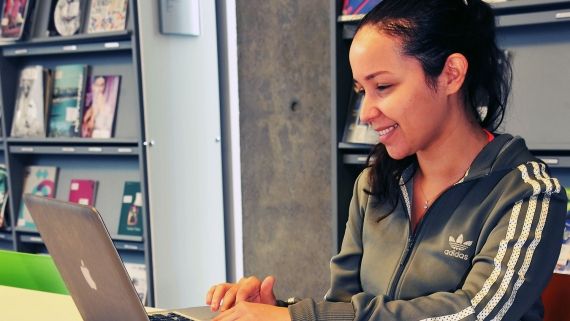
Occupational Therapist Degree Apprenticeship (Level 6)
| Level | 6 |
| Degree | BSc (Hons) Occupational Therapy |
| Duration | 36 Months |
| Entry point(s) | Autumn |
| Campus | High Wycombe |
| Contact | apprenticeships@bnu.ac.uk |
As an occupational therapist, you will help people overcome difficulties carrying out day-to-day activities. It is a fulfilling role and a great way to give back to the community, and that’s why our inspirational work placements are close to home in Buckinghamshire, Berkshire, Oxfordshire and the surrounding areas. With insightful teaching, amazing facilities and a friendly student community, there is no limit to where you can go with BNU
Occupational therapy involves enhancing the daily lives of people with a broad range of physical, mental health and social needs. As an occupational therapist you will work with people of all ages, to improve their wellbeing and quality of life.
Our occupational therapy degree apprenticeship will equip you with the skills to practise as a competent occupational therapist in a wide variety of health, social care, and alternative environments. Your studies will cover the theory and practical aspects of this exciting and varied role.
Working with a range of people who all have different requirements, you will need to understand each client's lifestyle so that you can work with them to create the best treatment plan. We help you take a holistic approach to each client's physical and mental wellbeing and evaluate all their needs - physical, social, psychological and environmental.
You will have the skills to be able to assess, plan, implement and evaluate treatment plans in hospital and community settings and establish realistic goals with clients, or know when to refer clients to other specialists when needed.
Organising support and rehabilitation groups for carers and clients will be a big part of your role, you will be able to contribute to the analysis, planning, audit, development and evaluation of services, using the skills you gain while studying at BNU.
Programme aims
Produce a graduate who fulfils the requirements to be eligible to apply for registration with the Health and Care Professions Council (HCPC) as an occupational therapist.
Provide a stimulating, and academically sound education, enabling graduates to practice within a complex environment effectively, flexibly, and responsively as competent occupational therapists.
Develop the skills of critical thinking, professional reasoning and a research informed evidence-based approach to the application of high quality contemporary occupational therapy practice.
Produce graduates who are resilient and have the skills of accountability, leadership, entrepreneurship, enterprise and innovation to drive the profession and healthcare forward.
Enable graduates to reflect on their practice and exercise professional autonomy following legislation, policies, procedures, and best practice.
Programme Learning Outcomes
Knowledge and Understanding (K)
On successful completion of the programme you will be able to:
| ID | Learning Outcome |
| K1 | Demonstrate a coherent and detailed knowledge of human anatomy, physiology, psychology and sociology, relating these to participation in everyday occupation. |
| K2 | Critically analyse the relationship between occupation, health and well-being and the factors that facilitate or challenge participation in occupations. |
| K3 | Critically evaluate the health and social care systems, policy and legislation priorities for the enhancement of occupational therapy services. |
| K4 | Critically discuss occupational justice in relation to the occupational performance of individuals, groups, and communities and the value of participation in meaningful occupations. |
| K5 | Synthesise theories from occupational science and other relevant bodies of knowledge to form the foundation of safe reasoned professional practice. |
Analysis and Criticality (C)
On successful completion of the programme you will be able to:
| ID | Learning Outcome |
| C1 | Critically analyse relevant theoretical frameworks and concepts acknowledging the importance of occupation and participation to the well-being of individuals groups and communities. |
| C2 | Enhance practice through skills of analysis in complex human performance where occupational barriers exist. |
| C3 | Critically reflect upon contemporary theoretical perspectives which provide the underpinning knowledge base for professional practice recognising the importance of participation and occupation. |
| C4 | Critically reflect on and understand the underpinning knowledge necessary to work effectively with individuals with occupational needs. |
| C5 | Analyse health and well-being through the application of occupational science to individuals, groups and communities. |
Application and Practice (P)
On successful completion of the programme you will be able to:
| ID | Learning Outcome |
| P1 | Apply critical thinking and leadership skills to support occupational therapy practice, encourage self-development and to promote service improvement. |
| P2 | Critically evaluate and synthesise research, demonstrating the ability to use research to enhance clinical practice. |
| P3 | Communicate in a professional and effective manner with service users, colleagues, and others in accordance with professional standards. |
| P4 | Deliver inclusive, accessible, culturally relevant occupational therapy to individuals, groups and communities with diverse needs. |
| P5 | Demonstrate comprehensive, systematic occupational therapy assessment skills maintain clear, accurate and complete records. |
Transferable skills and other attributes (T)
On successful completion of the programme you will be able to:
| ID | Learning Outcome |
| T1 | Evaluate your own learning needs and plan your own continuing professional development. |
| T2 | Demonstrate the essential skills of negotiation, engagement and facilitation to allow effective team working and partnerships with colleagues, other health and social care professionals, service users, carers and their families to promote participation, health and well-being. |
| T3 | Recognise own values, principles and assumptions and develop self-awareness establishing a non-judgemental and anti-discriminatory attitude, which is sensitive to the values and interests of others. |
| T4 | Demonstrate problem solving skills, critical thinking skills and professional judgement in both routine and complex, unpredictable and challenging situations. |
| T5 | Practice as a reflective, critical, evaluative, and evidence-based occupational therapist with the entrepreneurial skills required to obtain and further develop employment in traditional, alternative, non-traditional or role-emerging settings. |
This programme will provide the key knowledge and skills to achieve what is both required and expected within the contemporary health and care setting and uses a modern and innovative integrated blended learning approaches to teaching and learning, including simulation, lectures, seminars, group activities and learner-centred approaches using technology to support face-to-face teaching requiring university attendance, virtual access and attendance at clinical practice placement.
To further ensure each individual is deemed clinically competent, clinical placements will be undertaken throughout the length of the programme. Apprentices will receive guidance and support throughout their learning journey from the Apprenticeship Hub through regular reviews and contact. As a graduate from the programme, you will be equipped with the knowledge, skills and attitudes/values commensurate with occupational therapy practice. In addition, you will be a reflective, evidence-based practitioner with potential leadership skills and the ability to promote the unique features of the profession in a modernising health and social care arena.
There is a dedicated space on the Virtual Learning Platform to facilitate communication between the apprentices and the programme team. Blended learning supports digital literacy development, which is essential for working in the current and future health and social care environments.
Professional competence and clinical skills will be addressed during the programme through simulated skills sessions, workshops, problem-based learning and practice-based learning (practice placements) within the local NHS Trusts, independent healthcare providers, social care and education settings. Practice-based learning will provide real experience into the role of the occupational therapist and the range of their scope of professional practice.
Why choose BNU?
At Buckinghamshire New University, we are dedicated to equipping our graduates with the skills employers demand. We will work with you using our practice-based learning expertise to support your training needs.
Higher and degree apprenticeships are a partnership between industry and higher education institutions set up to help meet the needs of employers. They also provide a flexible way for employees to take advantage of the life-changing opportunities that higher education can offer them.

At BNU, we change lives through employment-focused teaching which enables our students to achieve their ambitions. As a small and personal university, we offer an agile approach to all apprenticeship training needs. You would also gain access to all our support services including Student Hub, Multi Faith Chaplaincy, Disability and Inclusion, Counselling, Library and Alumni Benefits.
Apprentices will receive guidance and support throughout their learning journey from the Apprenticeship Hub through regular reviews and contact. As a graduate from the programme, you will be equipped with the knowledge, skills, attitudes and values commensurate with occupational therapy practice. In addition, you will be a reflective, evidence-based practitioner with potential leadership skills and the ability to promote the unique features of the profession in a modernising health and social care arena.
How will I be taught and assessed?
This work-based learning apprenticeship programme provides the same content as our BSc (Hons) Occupational Therapy full-time programme. However, the degree apprenticeship programme is organised differently to enable you to continue to work in your employment while spending 14 hours, 2 days per week, as a registered student at the university to work towards your occupational therapy qualification.
A work-based approach provides work-based learning, in-person teaching requiring university attendance, and attendance at and successfully passing all practice-based learning (practice placements). This approach is adopted throughout the programme for knowledge and skills acquisition and development. A range of different teaching and learning approaches are used, each designed to support the learner’s learning and development of subject expertise or competence. This includes face-to-face contact made up of practical workshops, seminars, tutorials, and problem-based learning in small groups. As well as face-to-face contact, some of the theoretical components will be delivered online via different mediums including webinars, videos and discussion forums. A virtual learning environment (VLE) will support you with online learning content, resources and contemporary technologies that enhance traditional face-to-face teaching. Independent study will be expected under the guidance of the module leader. This will include wider reading, preparation for lectures and reading and planning to prepare for assignment submission.
The development of learning materials and activities that scaffold learning across the different learning environments will enable you to focus on individual or complementary aspects of the curriculum. Our approach to learning aims to be continuously relevant to practice by utilising experienced service users, registered occupational therapists and other healthcare professionals. This will give you access to a breadth of expertise across a wide variety of professional specialisms throughout the programme. Professional competence and clinical practice skills will be addressed during the programme through simulated skills sessions, workshops, problem-based learning.
All our degree modules will include online activities and we will engage in positive and formative feedback on your work. Forms of formative feedback include peer feedback, discussions, and in-class (face-to-face) interactions. Feedback from exams will be provided within the 3-week turnaround as per the University guideline for feedback.
The following assessment activities are used on this programme:
- viva exams with a focus on the evaluation and application of theoretical knowledge
- practical exams (OSCE) with a focus on skills and theory
- written exams
- written coursework with a focus on critical evaluation and analytical writing
- online portfolios with a focus on critical analysis, reflective practice, and professional development
- clinical case studies
- research literacies are assessed sequentially in the first-year research methods module and the final dissertation module
Practice-based Learning (Practice Placement)
The World Federation of Occupational Therapists (WFOT) requires learners to successfully complete and pass a minimum of 1000 practice-based learning (practice placement) hours to register with the Health Care Professions Council (HCPC). This will be outside your usual place of work (your usual service). Employers will source practice placements for apprentices, and these could be within the organisation where apprentices are employed.
There are three 10-week practice placements, one in each year of the programme. The practice placement study blocks undertaken by the learner are in a variety of practice areas where you will also be continuously assessed, such as physical and mental health settings across a variety of NHS trusts, social care, independent healthcare providers, including the voluntary sector and education settings within Buckinghamshire, Berkshire, Oxfordshire, and the surrounding areas.
A practice placement week would typically consist of 37.5 hours within the practice setting, including a half-day self-study. This would be achieved through 5 days of attendance (Monday-Friday).
Practice-based learning (practice placement) is a key part of occupational therapy training. However, being assessed is not something to fear. BNU wants the best outcome for you and we will always provide you an opportunity to improve, learn and grow.
Practice is a key part of occupational therapy training However, being assessed is not something to fear. BNU wants the best outcome for you and we will always provide you an opportunity to improve, learn and grow.
Apprenticeship Eligibility
To be eligible for the Occupational Therapy Degree Apprenticeship, apprentices must meet the following requirements:
5 GCSE's including Maths, English and a Science at grade 4 / C or above or equivalent e.g. level 2 functional skills in Maths and English, level 2 adult literacy and numeracy
And one of the following:
- 120 -136 UCAS tariff points (e.g. 3 A Levels at grades BBB or above)
- or
- BTEC Level 3 extended diploma (before 2010 known as BTEC national diploma level 3) DMM in a health-related subject
- or
- International Baccalaureate (30 points)
- or
- Access to Higher Education course in Science, Health, Social Care or similar (60 credits, of which 45 credits will be at Level 3, including 30 at distinction grade and 30 at merit grade)
- Satisfactory completion of an Enhanced Disclosure from the Disclosure Barring Service (DBS)
In addition to this, for apprentice applicants, the following level 3 qualifications can also be accepted:
- Level 3 Diploma in Health and Social Care
- NVQ level 3 in Health and Social care
- Science Level 3 Healthcare Support Worker qualification
Applicants with a previous degree will be considered on an individual basis. Applicants who do not meet the entry requirements may have relevant professional experience, and can still be invited for interview, where they will be required to demonstrate the necessary knowledge and understanding for entry onto the course.
Applicants with Disabilities
We take seriously our obligation to make reasonable adjustments to ensure that all learners with disabilities can successfully complete their studies. All applicants will be assessed based on the criteria outlined here, regardless of any disability. If you declare a disability, we will invite you to work with us to explore how best we can support your studies.
Application Process
The process of the apprenticeship application, selection and admission is conducted through the Apprenticeship Hub in collaboration with the occupational therapy programme Admissions Tutor and is led by employers. The University (Occupational Therapy Admissions Tutor) will consider applications and will have the final decision on whether to accept the candidate for entry to the programme.
- Email your nominated Apprenticeship team representative with a document detailing names and contact details of your selected candidates
- Candidates will be sent a link to an online application which takes approximately 45 minutes to complete
- Candidates will be required to upload supporting documents such as prior certification (including Level 2 English and maths) and evidence of Right to Work in the United Kingdom
- After submitting the application, the Admissions team will complete all necessary eligibility checks
- Successful candidates will be invited to an interview with a member of the occupational therapy academic team and will be asked to fill in an Individual Needs Assessment (INA) document identifying their existing experiences, skills and knowledge, which will be discussed in the interview.
An apprentice can be a new or existing member of staff and must not already hold a degree in that area or be receiving funding for other training.
The employer must employ the apprentice in a genuine role with a genuine salary.
The apprentice must have the right to live and work in the UK.
The entry requirements will include:
- assessment of applicants through a values-based recruitment process based on an interview
- evidence of achievement and/or ability to study at the required academic level
At interview, applicants will be expected to demonstrate:
- the appropriateness of the programme for their career aspirations
- their awareness of the nature of occupational therapy
- their awareness of the academic, practice and professional requirements of the programme
Pre-enrolment checks
This programme is subject to the University’s Fitness to Practice Procedures. All successful applicants must agree to and sign our rules of professional conduct, which reflect the professional and regulatory body standards of practice and include consent to practical classes.
Applicants who have previously been enrolled in an occupational therapy pre-registration programme or any other health professional education programme must submit a self-declaration confirming no previous fitness to practise concerns.
All successful applicants are required to have a Disclosure and Barring service screening (DBS) and an Occupational Health screening conducted by their employer.
Occupational Health Checks and Immunisations
A satisfactory occupational health clearance and immunisations are required by all applicants prior to acceptance on the course. Candidates who fail the occupational health assessment will not be given entry onto the course.
You will need to show evidence of completed vaccination immunisations for Hepatitis B, BCG, Varicella, and Influenza, where applicable, before starting your practice-based learning (practice placement). These immunisations can be received from most GP surgeries in England. There is up-to-date information on the NHS Choices on how to obtain these.
Disclosure and Barring Service Screening (DBS)
Admission to the occupational therapy degree programme is subject to the Rehabilitation of Offenders Act (1994) section 4 (2) Exemption Order 1975 and DHSS HC 88 (9) guidelines regarding child protection and police checks. All applicants are required, as a condition of acceptance, to satisfactorily complete a criminal record disclaimer form and give their permission for their employer to obtain an enhanced police check with the Disclosure and Barring Screening Service (DBS). Each year after that, you are required to self-declare any police cautions or convictions before each practice placement module.
The DBS in the United Kingdom does not currently conduct overseas criminal record checks. Therefore, international applicants, those without British Citizenship and British Citizens with a significant period of overseas residency, require a criminal record check or certificate of good conduct from their home/overseas country prior to entry onto the course. International applicants need to obtain a recent criminal record certificate from their home country and ensure that this is still valid by the date of enrolment in addition to the DBS requirements detailed above. A list of admissible certificates can be found on the UK Government website.
Where an equivalent check is provided, applicants are required to complete an enhanced police check with the DBS a year later.
Modules
This provides a guide of the modules that make up your course. You can find more information about how your course is structured on our Academic Advice section.
In many instances apprenticeships are fully funded through the government’s Apprenticeship Levy Fund and for those ineligible up to 95% is funded through the government’s Co-Investment Fund.
Occupational Therapist Degree Apprenticeship Cost: £24,000
The apprenticeship levy will be paid by employers in any sector with a pay bill of more than £3 million per year. Those employers will be able to use their apprenticeship levy funds to fund this programme.
Non-levy paying employers will receive up to 95% funding towards the costs of this apprenticeship.
For more information on funding and the Apprenticeship Levy visit our Apprenticeship Funding page in the Find out more section below.


